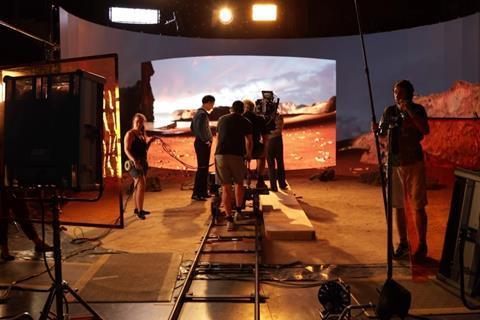ScreenSkills is partnering with the TV Access Project (TAP) to exclusively host training resources for disability inclusion in the UK screen industries, through organisations committing to certain measures to improve standards for deaf, disabled and neurodivergent talent.
Officially launched in August 2022, the TV Access Project (TAP) is an alliance of the UK’s biggest broadcasters and streamers who have pledged to work together to create a substantive and permanent structural shift in current access in the industry.

TAP has produced guidelines for disability inclusion in the UK television production industry called The 5 As: Anticipate, Ask, Assess, Adjust, Advocate. This includes a series of free accessible videos which training organisations can use within their own courses and workshops to highlight best practice.
The TV Access Project is an alliance of 10 of the UK’s biggest broadcasters and streamers who have pledged to work together. The Screenskills partnership aims to reach the shared vision to see full inclusion in the television industry by 2030, where no disabled talent is ever excluded because barriers have been removed and equity created.
Heloise Beaton, Project Lead for the TV Access Project, said of the 5As: “I’ve worked with ScreenSkills in the past to deliver training around disability inclusion in the screen industry and it’s affirming when you’re working with a group who are tackling a new subject, challenging previously held ideas, and leave enthused to put new processes in place.
“Training is also an essential part of our industry, where there is such value in skill sharing and supporting upcoming talent, pulling from our own experiences and expertise.”
The standards reflect a collective responsibility to radically change the culture and practices of the TV industry, and have been drawn up by professionals from across the industry with lived experience and specialist expertise of disability. Members and partners of the TV Access Project have committed to embedding the 5 As across their organisations.
Beaton added: “Accessibility and inclusion shouldn’t be reserved solely for training sessions dedicated to accessibility and inclusion. It permeates every role, skill and department, and is the responsibility of all of us to ensure equity in the screen industries. At The TV Access Project, we want to support trainers to confidently embed conversations about accessibility into their training sessions, and that’s why we have worked with ScreenSkills to develop and launch the 5As training materials.”
The resources are available now to support organisations in advocating for disabled talent.
You are not signed in
Only registered users can comment on this article.

Netflix withdraws from race to acquire Warner Bros Discovery
Netflix has withdrawn from the race to acquire Warner Bros Discovery, leaving the way clear for Paramount Skydance to win the months-long battle for the historic Hollywood studio.

Charity publishes set of principles for mentally healthy productions
The Film and TV Charity has unveiled its new ‘Principles for Mentally Healthy Productions’ to help address systemic pressures and poor working practices across the UK screen sector, aiming to improve culture and conditions on productions.

Warner Bros Discovery and BBC report strong Winter Olympics viewing
Warner Bros. Discovery (WBD) and the BBC have both reported strong viewership results for their coverage of the Olympic Winter Games for Milano-Cortina 2026.

Sports programming surges on major streaming platforms
Sports programme offerings across the top five subscription video-on-demand (SVOD) services jumped 52% year-over-year, according to research by Gracenote, the content data business unit of Nielsen.

EIT Culture & Creativity becomes IBC2026’s European Innovation Partner
IBC has appointed the EIT Culture & Creativity as its European Innovation Partner for 2026.



